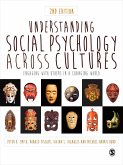Understanding Social Psychology Across Cultures Second Edition starts by asking why social psychology needs a cross-cultural perspective. It then examines cultural differences and their origins, before addressing traditional social psychological themes cross-culturally, for example group processes, self and identity, intergroup relations. Themes of contemporary relevance including migration, ethnic conflict and climate change are also covered.
Key features:
This textbook is appropriate for students of social and cross-cultural psychology. It will also interest practitioners wanting to understand the impact of culture on their fields of work, such as international relations, social policy, health promotion, ethnic relations and international business.
Key features:
- Presentation of concepts and theories made accessible to the reader using practical examples and everyday life experiences from diverse parts of the world
- Biographical portraits of key researchers in the field
- Coverage of the appropriate methods for conducting state-of-the-art cross-cultural research
This textbook is appropriate for students of social and cross-cultural psychology. It will also interest practitioners wanting to understand the impact of culture on their fields of work, such as international relations, social policy, health promotion, ethnic relations and international business.
Dieser Download kann aus rechtlichen Gründen nur mit Rechnungsadresse in A, D ausgeliefert werden.
'... For anyone eager to learn about how members of different cultures are fundamentally different - and yet sometimes remarkably similar - this book provides a great read.'
Roy F. Baumeister
Florida State University, Tallahassee, USA
'Understanding Social Psychology across Cultures 2e is an intellectual tour de force of the latest developments in cross-cultural social psychology. It is an essential resource for anyone interested in culture and human behavior.'
Michele J. Gelfand
University of Maryland, College Park, USA
'The new edition of this leading textbook in cross-cultural social psychology is the perfect introduction to the field. It has extraordinarily broad and up-to-date coverage of virtually all the important topics that have been studied.'
Shalom H. Schwartz
Hebrew University of Jerusalem, Israel
Roy F. Baumeister
Florida State University, Tallahassee, USA
'Understanding Social Psychology across Cultures 2e is an intellectual tour de force of the latest developments in cross-cultural social psychology. It is an essential resource for anyone interested in culture and human behavior.'
Michele J. Gelfand
University of Maryland, College Park, USA
'The new edition of this leading textbook in cross-cultural social psychology is the perfect introduction to the field. It has extraordinarily broad and up-to-date coverage of virtually all the important topics that have been studied.'
Shalom H. Schwartz
Hebrew University of Jerusalem, Israel








